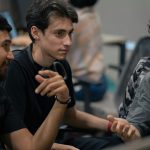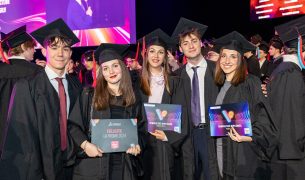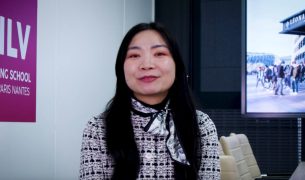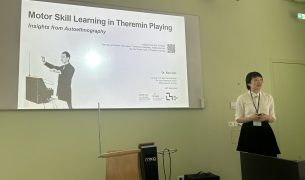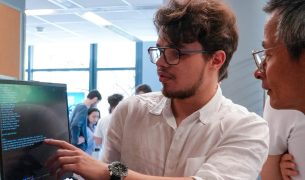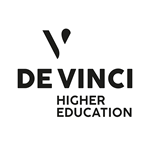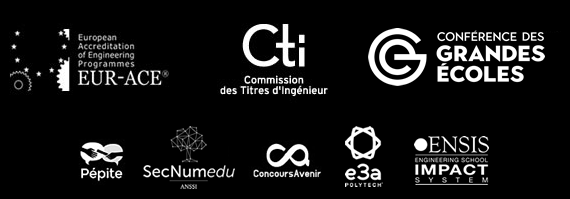De Vinci Higher Education will introduce a tuition fee waiver in October 2025 to support international candidates enrolling in the MSc programmes at ESILV.
The scholarship initiative reflects a broader commitment to enhancing global representation in engineering education.
A Financial Incentive to Promote International Access
De Vinci Higher Education is offering a 30% tuition fee waiver for qualified international candidates applying to the Master of Science programmes at ESILV. This financial support, named the De Vinci Excellence Scholarship, is designed to reduce the cost of studying engineering in France for talented students from abroad.
The scholarship, granted by the De Vinci Higher Education group, applies directly to the student’s annual tuition fees.
Who Is Eligible?
The De Vinci Excellence Scholarship is available to non-French applicants who submit their application via the international portal for the October 2025 intake. To be considered, candidates must:
- Apply to an MSc programme at ESILV;
- Present a general average of at least 13/20 (or 65%) on their most recent degree;
- Confirm their enrolment by paying 50% of the tuition before 30 April 2025.
These criteria ensure that selected students demonstrate academic ability and a clear intention to pursue their education at ESILV.
How to Apply
Interested candidates must complete their application and receive admission to the MSc programme. Once admitted, the application will be automatically reviewed for scholarship eligibility. There is no separate scholarship application form to complete.
The De Vinci International admissions office administers the scholarship and oversees all incoming international MSc candidates.
About the MSc Programmes at ESILV
The Master of Science degrees at ESILV are designed to combine technical depth with professional experience.
Key features of the programme include:
- Duration: 12 months;
- Structure: one semester of full-time academic coursework, followed by a semester dedicated to an internship and the master’s thesis;
- Tuition fees: €12,900 per academic year.
These postgraduate programmes aim to equip students with the tools to transition smoothly into international engineering careers, combining classroom learning with real-world application.
MSc Aeronautical & Aerospatial Engineering
This MSc, focused on students pursuing careers in the aeronautical and aerospace sectors, bridges the gap between design, technology, and real-world applications. The curriculum covers advanced aerodynamics, propulsion, avionics, and material science, supported by hands-on experience with simulation tools and laboratory work.
Multidisciplinary teamwork, problem-solving, and autonomy are central to the learning approach, ensuring graduates are prepared to tackle industry challenges and contribute to innovation in aircraft and space system development.
MSc Financial Engineering
This programme prepares students to navigate complex financial systems through a quantitative and analytical lens. Combining finance, mathematics, and data science, it offers training in financial modelling, risk analysis, and investment strategy.
Students gain practical experience using tools like Bloomberg and work with real-time financial data to simulate market scenarios and decision-making environments. The MSc equips graduates for roles in investment banking, asset management, and financial consultancy.
MSc Fintech & Digital Banking
Developed in collaboration with EMLV Business School, this programme combines finance and technology to address the growing demand for digital innovation in the banking sector.
The curriculum includes artificial intelligence, blockchain, big data, and cybersecurity. Students explore payment systems, digital currencies, and evolving regulatory frameworks. The programme also emphasizes entrepreneurship and innovation within the fintech landscape.
MSc Computer Science & Data Science
The MSc Computer Science & Data Science is a one-year international programme designed for computer science graduates who want to specialise in the technologies shaping the digital world.
The curriculum combines theoretical knowledge and practical training, focusing on key areas such as cybersecurity, artificial intelligence, green computing, and software development.
Delivered in a multidisciplinary environment, the programme emphasises technical and soft skill development to ensure graduates are ready for professional roles in IT and digital innovation. Aligned with current industry needs, the MSc also prepares students to adapt and learn continuously throughout their careers in a rapidly evolving tech landscape.
MSc Cyber Resilience & Crisis Leadership
The MSc Cyber Resilience & Crisis Leadership is a one-year programme designed to equip students with a strategic understanding of cyber threats and organisational resilience. Delivered over two semesters, it combines on-campus seminars with online learning, covering topics from cybersecurity fundamentals to crisis management and holistic resilience.
The curriculum includes a Capstone Project and an internship, which academic experts and industry professionals teach to ensure practical experience. Graduates are prepared to take on leadership roles in navigating and managing complex cyber challenges.
MSc Computer Graphics & Game Engineering
The MSc Computer Graphics & Game Engineering is a one-year programme for students aiming to excel in the video game industry. Combining ESILV’s engineering expertise with IIM Digital School’s game development specialisation, the curriculum focuses on advanced programming, game engine development, and real-time problem-solving.
Key topics include tool programming, AI, DevOps, and immersive technologies. The first semester offers intensive coursework, followed by a second-semester internship, providing students with academic grounding and hands-on industry experience.
MSc Innovation & Creative Technology – ESILV
The MSc Innovation & Creative Technology is a one-year programme for engineering or design students who want to connect research, innovation, and industrial application. It offers a transdisciplinary environment where students develop both technical and soft skills.
Through project-based learning alongside researchers and PhD students, the programme focuses on advanced methods and technologies, fostering autonomy, critical thinking, and creativity in innovation-driven contexts.
A Step Toward More Inclusive Engineering Education
Through this scholarship, De Vinci Higher Education reaffirms its commitment to accessibility and inclusion in international higher education.
By lowering financial barriers, the institution supports students in pursuing their goals within a global, tech-driven context.











